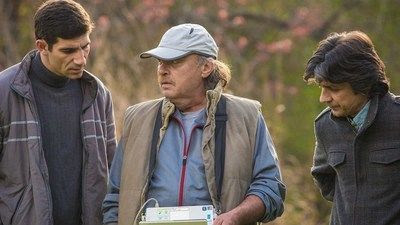 |
| Image courtesy of Walt Disney Studios. |
Directed by Craig Gillespie ("Lars and the Real Girl"), the film boasts some terrific special effects during the scenes in which Coast Guard Bernie Webber (Chris Pine) and his crew - which includes Ben Foster, Kyle Gallner and John Magaro - set out to save a group of 20-some men, led by Casey Affleck's captain, whose tanker has flooded and broken apart during a massive storm in Massachusetts circa 1952.
Prior to these intense scenes of digital wizardry and human valiance, there are some slightly waterlogged scenes involving Pine's courtship of Miriam (Holliday Grainger), whose won't-take-no-for-an-answer attitude gives her character some personality, which is otherwise not utilized to its maximum potential.
In other words, most of the characters here serve only their specific purposes, such as: Bernie (brave Coast Guard who failed to save a man during a rescue a year prior and likes to play by the rules), Eric Bana's Cluff (Coast Guard commander who's an outsider and unsympathetic to pleas that the attempted rescue would be a suicide mission), Miriam (strong-willed romantic interest, whose job during the second half of the picture is to wring her hands), Affleck's Sybert (soft spoken captain of the tanker who is second-guessed by everyone, only to be proven right). You get the gist.
However, once Pine and company are on the water, the film gets fairly intense. It's difficult to watch a scene involving four men on a tiny boat smacking against gargantuan waves and not get at least a little involved in their plight. And the picture does a pretty solid job of emphasizing just how miraculous this rescue mission was, considering that Webber's boat - which was meant to carry 12 persons - ended up hauling just under 30 men back to shore.
So, "The Finest Hours" is the type of film I could almost recommend. It's not as well-made as Wolfgang Petersen's "The Perfect Storm" - another movie about a capsized boat that had a little more of an emotional pull and sense of place than this one - but it's not half bad. The cast, Pine especially, is solid, although a few of those Bah-ston accents are of the type that might induce eye-rolling.
Gillespie's film certainly has its moments and you could do far worse, especially considering the other films in wide release this January. Should you decide to see it, I'd recommend the non-3D option. I saw the picture in 2D and have read elsewhere that the 3D conversion has resulted in making the numerous sequences of gigantic waves crashing on boats a bit murky.







